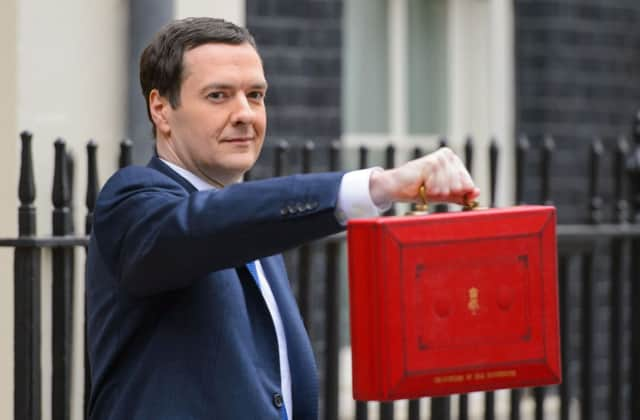Capital spending tax relief tops business Budget wishlist


The annual investment allowance, which gives companies 100 per cent tax relief on capital spending, is set to fall from its current level of £500,000 to just £25,000 from January 2016.
It is the fifth time the allowance has changed since 2008.
The Institute of Directors (IoD) and British Chambers of Commerce urged Mr Osborne to scrap the planned reduction so businesses can invest for growth.
Advertisement
Hide AdAdvertisement
Hide AdStephen Herring, head of taxation for the IoD, told The Yorkshire Post that businesses would back a freezing of the allowance, after watching it be “bounced up and down” in recent years.
He said: “What business would welcome is if he announced it was going be frozen at £500,000 for the next five years, or even better, that it was increased, perhaps up to £1m.
“We think it would boost capital spending and provide a more predictable environment to encourage business investment.”
Mr Herring added: “Business likes stability and predictability and not surprises.
Advertisement
Hide AdAdvertisement
Hide Ad“Surprises should be limited to birthdays, they don’t have a part in business taxation.”
The annual investment allowance was initially raised from £50,000 to £100,000 in April 2010, before dropping down to £25,000 in April 2012.
In January 2013, the threshold climbed to £250,000, before doubling to its current level in April 2014.
West and North Yorkshire Chamber of Commerce called for a permanent annual investment allowance of £500,000 to promote balanced growth and tackle the uncertainty created by the “chopping and changing” of incentives and tax structures.
Advertisement
Hide AdAdvertisement
Hide AdAndrew Lindsay, chairman of the chamber, said despite the challenges businesses face due to global difficulties, such as conflict in the Middle East and a sluggish Eurozone, the biggest risk to business is “political and homegrown”.
He said: “Businesses have grown tired of constant chopping and changing in the tax system.
“They need long-term certainty, rather than short-term incentives, to help support investment decisions.
“A long-term investment allowance would give much-needed certainty.”
Advertisement
Hide AdAdvertisement
Hide AdImprovements to premises, which are not currently covered by the scheme, should also be included to help firms looking to expand their workforce or enhance efficiency, he added.
The estimated average cost of a permanent £500,000 annual investment allowance is £963m a year, the chamber said.
This could be funded through a 0.1 per cent reduction to the average annual level of expected government current spending or a reallocation of less than a fifth of the average departmental underspend recorded over the last four years, it added.
The CBI joined calls for a permanent investment allowance, proposing the level be set at £250,000.
Advertisement
Hide AdAdvertisement
Hide AdThis would cost £670m in 2016/17 before rising to £754m by 2019/20, the lobby group said.
CBI director-general John Cridland said the UK currently compares poorly with many key European economies for investment from smaller firms.
He said: “A permanent AIA set at £250,000 will get more of our mid-sized companies investing in their factories and production lines.”
With just 12 days to go until the dissolution of Parliament, Mr Osborne is unlikely to include dramatic new measures in his last Budget before May’s general election, IoD’s Mr Herring said.
Advertisement
Hide AdAdvertisement
Hide Ad“What we’re more likely to see is some changes in parameters and thresholds, the amount of fixed allowances there might be,” he said.
“The more complex matters will have to await the outcome of the election.”
There could be giveaways around personal tax allowances, as well as a possible “wildcard” announcement of a consultation into reforming the inheritance and capital gains tax rules, he added.
Ahead of the Budget, the Government confirmed it will conduct a full review of the business rate system, with results expected in time for the 2016 Budget.
Advertisement
Hide AdAdvertisement
Hide AdIt follows calls from industry lobby groups and businesses for an overhaul of the “outdated” high street taxes.
---
A possible deferral of the diverted profit tax due to start next month has been backed by the Institute of Directors (IoD) in its Budget wishlist.
In December, Chancellor George Osborne announced plans for the so-called ‘Google tax’ to stop multinational corporations shifting earnings to lower their tax bills.
IoD head of taxation Stephen Herring said plans to apply the tax to earnings from April 1 2015 had left “insufficient time for consultation”.
Advertisement
Hide AdAdvertisement
Hide AdHe said: “The UK still needs new entrepreneurs and foreign direct investment.
“We’ve had a lot of comments from members and from industry generally that there’s acceptance large international groups shouldn’t be in a better position than domestic companies for tax, but there are concerns that the consultation so far has left the tax too confusing and complex.”
The IoD hopes Mr Osborne and Labour shadow chancellor Ed Balls will agree to defer the tax’s introduction, despite the political nature of the debate.
“Business and the economy should really take precedence over party political shenanigans in the run up to an election,” Mr Herring added.